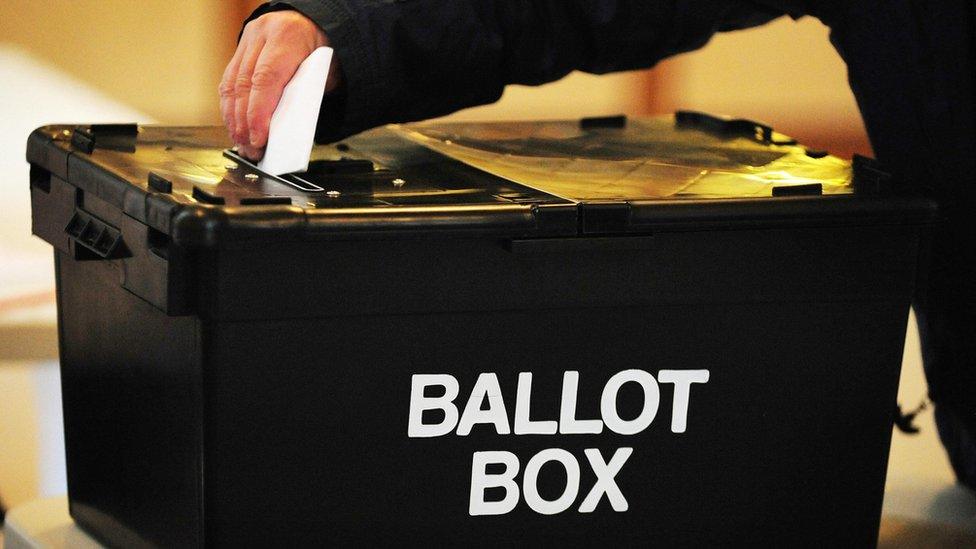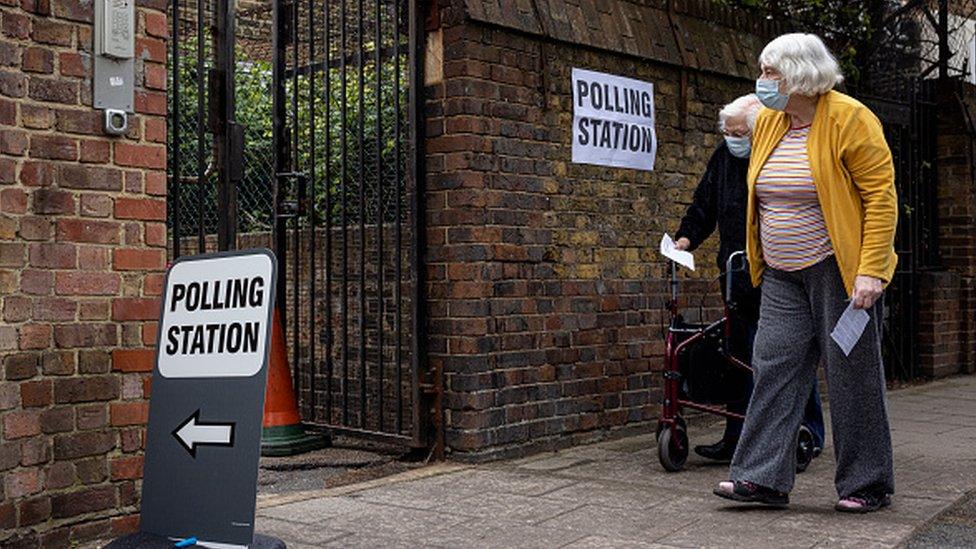Voter ID: Less than 1% of eligible voters in Essex apply for government ID scheme
- Published

Voters in local elections in England on 4 May must show photo ID at polling stations in order to vote
Less than 1% of people who require photo ID in order to vote in Essex council elections have applied for the relevant paperwork.
Voters in local elections in England on 4 May must show photo ID at polling stations in order to vote.
Those without an appropriate ID should apply for a Voter Authority Certificate (VAC) from their council by 25 April.
Uttlesford has had 12 applications, Brentwood has 15 and Rochford and Castle Point have had 23 each so far.
Mandatory voter ID for elections was backed by MPs last year.
There are about 20 types of acceptable ID, external that can be used including driver's licences, passports and photographic travel passes.
The government has estimated that between 2% and 4% of eligible voters need a VAC, which equates to between 2,000 and 6,000 people in each council area but new figures have revealed that only 1% of those without valid documents have signed up for one.

The BBC asked all local authorities in Essex how many applications had been received:
Braintree District Council - 26
Brentwood Council - 15
Castle Point Borough Council - 23
Chelmsford City Council - 39
Colchester City Council - 79
Harlow Council - 47
Maldon - no figures for applications but estimates 888 to 2661 electors may need to apply for a VAC
Rochford District Council - 23
Southend City Council - 103
Tendring District Council - 95
Thurrock Council - 80
Uttlesford District Council - 12

Councils have said the government estimate of people needing a VAC is based on numbers eligible to vote but that not all of those people would turnout.
Southend City Council estimated it could have 6,500 people without a recognisable form of Voter ID but as average turnout at a local election is about 35%, it would potentially reduce the number to 2,000.
Braintree District Council, one of the areas that trialled voter ID in 2019, has had 26 applications.

The government says voter ID checks will prevent fraud, but critics argue the move could depress turnout
Chelmsford City Council's Liberal Democrat deputy leader, Marie Goldman, said it was "concerning" that only 39 people out of an estimated 5,000 residents eligible to vote had applied for a VAC and she would like to see the system scrapped.
As well as the extra planning and logistics required, she said that there was no evidence of the voter fraud which the government said photo ID would help to combat.
Ms Goldman said the changes would disproportionately hit areas where people are less likely to already own photo ID.
She said in 2021 there were 79 allegations of voter fraud nationally, with only two of those resulting in cautions and no convictions and in 2019 there was one conviction and one caution.
"These are figures from across the entire country so the argument that we need to bring this in because of voter fraud is really quite strange," she said.
"There are so many things that the government needs to deal with and we're constantly told that we don't have any money... so how has voter fraud and voter ID made its way to the top of the pile?
"This is going to make more people stay at home and disenfranchise a lot of people."
A government spokesman said: "We cannot be complacent when it comes to ensuring our democracy remains secure.
"Everyone eligible to vote will have the opportunity to do so and 98% of electors already have an accepted form of identification.
"Photo identification has been used in Northern Ireland elections since 2003 and we're working closely with the sector to support the rollout and funding the necessary equipment and staffing."
The councils have said they expect demand to increase nearer to the 25 April deadline and many will run awareness campaigns during the run up to this date.
Photo ID is not needed for postal votes.

Find BBC News: East of England on Facebook, external, Instagram, external and Twitter, external. If you have a story suggestion email eastofenglandnews@bbc.co.uk, external
Related topics
- Published21 February 2023

- Published18 January 2022
